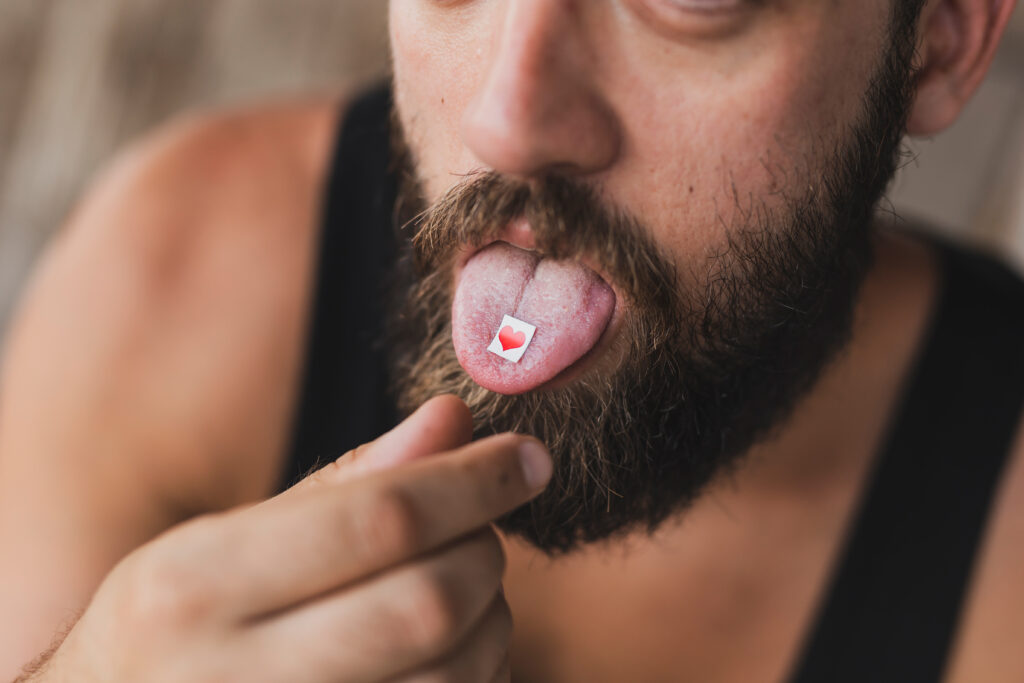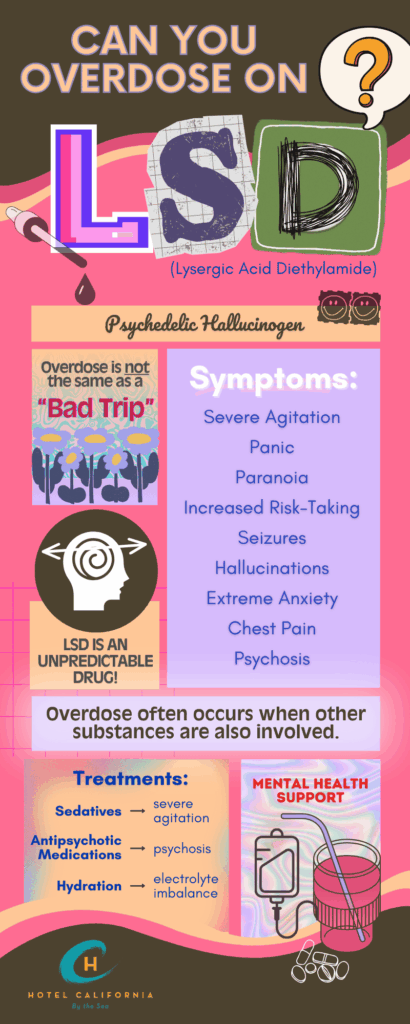Can you overdose on LSD?
LSD is a psychedelic hallucinogenic drug that is capable of altering a person’s thoughts and perceptions. Generally speaking, hallucinogenic substances are not known to be addictive or cause overdose. But is LSD addictive? Can you overdose on LSD?

An overdose from LSD is very rare. Many people equate an LSD overdose with having a bad trip. However, they are two different phenomena. And the drug on its own does not usually cause an overdose. Overdose from LSD most often occurs when other substances are also involved. This is often the case when purchasing LSD illicitly. Street drugs can be mislabeled, inaccurate or not produced in a sterile environment. This means they can become contaminated with other substances that contribute to an overdose.
Psychedelics like LSD are also generally not considered addictive. But they can cause tolerance and dependence, in which the user will continue to need more in order to achieve the same effects.
What is LSD?
Lysergic acid diethylamide (LSD) is also often referred to by its street names Acid, Dots, Mellow Yellow and Window Pane. It is a Schedule I controlled substance with high potential for misuse and no acceptable medical use. It is a colorless and odorless synthetic drug produced in labs that can produce a slightly bitter taste.
A 2021 study described psychedelics like LSD as a serotonergic hallucinogen. LSD primarily affects the perception of the cognitive process in the brain through the serotonin receptors. Because LSD is a serotonin receptor agonist, it doesn’t impact executive functions like depressed breathing or heart rate. This makes overdose much less likely to occur when taking LSD.
Compared to other mind-altering substances, LSD is generally considered safe when taken on its own. Recreational doses of 50-200 micrograms are typically non-toxic. However, when misused, it can cause uncomfortable psychological and physical symptoms.
Types of LSD use
- Recreational Use – Recreational use consists of experiencing visual hallucinations, euphoria, mystical experiences, detachment from reality and surroundings. Recreational use is often a way for users to cope with stress and experience spiritual awakenings.
- Medical Use – Although legally, LSD has no acceptable medical use, there is some research that has found hallucinogenic substances effective in treating certain mental health disorders. Conditions such as anxiety and depression are mental health disorders that can potentially benefit from LSD treatment therapy. However, there is still not enough research and evidence that fully proves this theory.

Can you overdose on LSD?
Overdose occurs when there are toxic amounts of LSD or an LSD drug combination overwhelms the system, which can cause life threatening symptoms. It is difficult to overdose on LSD. In fact, many people often mistake having a bad trip as a symptom of overdose.
High doses of the drug can commonly cause a bad trip. Bad trips can be intense and distressing. However, they are not life threatening and subside when the drugs is processed and leaves the body.
LSD is an unpredictable drug. It can be difficult to gauge when a person may be experiencing an overdose or may just being experiencing a bad trip. It is important to distinguish between an overdose and a bad trip.
Symptoms of an LSD overdose can include feelings of severe agitation or panic, paranoia, increased risk-taking, seizures, chest pain, psychosis and other forms of psychological distress. LSD overdose is rarely fatal and occurs as a slow onset of psychological symptoms before any physical symptoms begin to show. There is no set standard for how much LSD can cause an overdose.
Treatment for an overdose consists mainly of supportive care and possible sedative medication to treat symptoms of agitation.
A bad trip occurs when a user takes high doses of LSD. It can cause unsettling visual and auditory hallucinations, paranoia, symptoms of anxiety, symptoms of depression, symptoms of psychosis, depersonalization and a warped sense of time.
When a person takes too much LSD or too high a dose, they can experience terrifying hallucinations. As much as it may seem dangerous, there is no lethal dose of LSD. In some cases, a person may have used LSD many times before without having any problems. And then when they use it the next time, they may unexpectedly have a bad trip.
Is LSD Addictive?
LSD is not considered an addictive drug. It is not a physically addictive drug. However, continued misuse and abuse of the drug can lead to tolerance and dependence. Over time the body will build up a tolerance to LSD and the user must continue to use and use more in order to achieve the same effects and produce the same high.
LSD users don’t normally crave the drug. When drug use has stopped, it does not cause physical withdrawal. When taking an average dose of 100 micrograms, the effects can be felt between 5-14 hours. When taking an average dose of 200 micrograms, the effects can be felt between 6-19 hours.
Check Your Insurance Coverage for FREE
Find out if your insurance covers addiction treatment in minutes. We accept most insurance!
How will I know if I have become dependent on LSD?
There are a few key signs to consider when asking yourself if you have become dependent on the hallucinogenic substance.
Are you taking more LSD than you intended to?
Have you wanted to stop or reduce LSD use, but have been unable to do so?
Are you spending too much time finding LSD, craving LSD and recovering from LSD use?
Have you slacked on your responsibilities at work and home due to LSD use?
Do you continue to use LSD despite negative consequences and continue to use LSD in risky situations?
If you have answered yes to any of these questions, you may have developed a dependence on LSD.
Risky Side Effects of LSD Use
- Hallucinations – seeing, hearing and feelings things that in reality aren’t really there
- Paranoia and prolonged psychotic episodes
- Dilated pupils
- High body temperature
- Increased heart rate and blood pressure
- Loss of appetite
- Tremors
- Derealization – when a person feels detached reality and from their surroundings.
- Hyperthermia, seizures and vomiting have been associated with doses exceeding 1000 micrograms
- Extreme anxiety
- Feelings of lost identity
- Panic
- Rapid mood swings
- Aggression and self mutilation
- Serotonin syndrome
- It can also increase the tolerance for other hallucinogenic drugs like PCP
- Impaired depth and time perception
Reach out to Hotel California by the Sea
We specialize in treating addiction and other co-occurring disorders, such as PTSD. Our Admissions specialists are available to walk you through the best options for treating your addiction.
Treatment for LSD Overdose and LSD Dependence
LSD is not addictive, but users can become physically dependent on the drug. LSD is also not a drug in which overdose is a common occurrence. If an overdose happens, it is most often due to polydrug use where LSD is mixed with other substances to enhance the other drugs effects. It can be used to enhance sexual experience, help one to zone out and be more introspective and can even help prolong a drug high.
Treatment options for an overdose of LSD mostly cater to the management of symptoms. Sedative medications may be used to treat severe agitation, antipsychotic medications can be used to treat psychosis, hydration for electrolyte imbalance and mental health support. Professional behavioral health programs like Hotel California by the Sea provide the tools, resources and support clients need to treat their substance use disorder.
We offer treatment at all levels of care including detox, residential, PHP and IOP. We utilized evidence-based treatment methods such as CBT, DBT and EMDR therapy. Hotel California by the Sea is dedicated to helping clients reach their goals for sobriety and overcome their addiction.
References:
https://www.healthline.com/health/substance-use/can-you-overdose-on-lsd
https://www.dea.gov/factsheets/lsd
https://recovered.org/hallucinogens/lsd/overdose
https://drugabuse.com/drugs/hallucinogens/lsd/overdose
https://www.addictioncenter.com/drugs/hallucinogens/lsd-addiction
https://www.medicalnewstoday.com/articles/are-psychedelics-addictive-side-effects-and-risks
